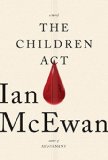Summary | Excerpt | Reading Guide | Reviews | Beyond the Book | Readalikes | Genres & Themes | Author Bio

To which Judith responded huskily that nothing denigrated a person, boy or girl, more than the denial of a decent education and the dignity of proper work; that all through her childhood and teenage years she had been told that her only purpose in life was to run a nice home for her husband and care for his children—and that too was a denigration of her right to choose a purpose for herself. When she pursued, with great difficulty, her studies at the Open University, she faced ridicule, contempt and anathemas. She had promised herself that the girls would not suffer the same limitations.
The opposing barristers were in tactical agreement (because it was plainly the judge's view) that the issue was not merely a matter of education. The court must choose, on behalf of the children, between total religion and something a little less. Between cultures, identities, states of mind, aspirations, sets of family relations, fundamental definitions, basic loyalties, unknowable futures.
In such matters there lurked an innate predisposition in favor of the status quo, as long as it appeared benign. The draft of Fiona's judgment was twenty-one pages long, spread in a wide fan facedown on the floor, waiting for her to take it up, a sheet at a time, to mark with soft pencil.
No sound from the bedroom, nothing but the susurrus of traffic gliding through the rain. She resented the way she was
listening out for him, her attention poised, holding its breath, for the creak of the door or a floorboard. Wanting it, dreading it.
Among fellow judges, Fiona Maye was praised, even in her absence, for crisp prose, almost ironic, almost warm, and for the compact terms in which she laid out a dispute. The Lord Chief Justice himself was heard to observe of her in a murmured aside at lunch, "Godly distance, devilish understanding, and still beautiful." Her own view was that with each passing year she inclined a little more to an exactitude some might have called pedantry, to the unassailable definition that might pass one day into frequent citation, like Hoffmann in Piglowska v. Piglowski, or Bingham or Ward or the indispensable Scarman, all of whom she had made use of here. Here being the limp, unperused first page hanging from her fingers. Was her life about to change? Were learned friends soon to be murmuring in awe over lunch here, or in Lincoln's or Inner or Middle Temple, And then she threw him out? Out of the delightful Gray's Inn flat, where she would sit alone until at last the rent, or the years, mounting like the sullen tidal Thames, swept her out too?
Back to her business. Section one: "Background." After routine observations about the family's living arrangements, about residence of the children and contact with the father, she described in a separate paragraph the Haredi community, and how within it religious practice was a total way of life. The distinction between what was rendered to Caesar and what to God was meaningless, much as it was for observant Muslims. Her pencil hovered. To cast Muslim and Jew as one, might that seem unnecessary or provocative, at least to the father? Only if he was unreasonable, and she thought he was not. Stet.
Her second section was entitled "Moral differences." The court was being asked to choose an education for two young girls, to choose between values. And in cases like this one, an appeal to what was generally acceptable in society at large was of little help. It was here she invoked Lord Hoffmann. "These are value judgments on which reasonable people may differ. Since judges are also people, this means that some degree of diversity in their application of values is inevitable..."
Over the page, in her lately developing taste for the patient, exacting digression, Fiona devoted several hundred words to a definition of welfare, and then a consideration of the standards to which such welfare might be held. She followed Lord Hailsham in allowing the term to be inseparable from well-being and to include all that was relevant to a child's development as a person. She acknowledged Tom Bingham in accepting that she was obliged to take a medium- and long-term view, noting that a child today might well live into the twenty-second century. She quoted from an 1893 judgment by Lord Justice Lindley to the effect that welfare was not to be gauged in purely financial terms, or merely by reference to physical comfort. She would take the widest possible view. Welfare, happiness, well-being must embrace the philosophical concept of the good life. She listed some relevant ingredients, goals toward which a child might grow. Economic and moral freedom, virtue, compassion and altruism, satisfying work through engagement with demanding tasks, a flourishing network of personal relationships, earning the esteem of others, pursuing larger meanings to one's existence, and having at the center of one's life one or a small number of significant relations defined above all by love.
Excerpted from The Children Act by Ian McEwan. Copyright © 2014 by Ian McEwan. Excerpted by permission of Nan A. Talese, a division of Random House LLC. All rights reserved. No part of this excerpt may be reproduced or reprinted without permission in writing from the publisher.




If we did all the things we are capable of, we would literally astound ourselves
Click Here to find out who said this, as well as discovering other famous literary quotes!
Your guide toexceptional books
BookBrowse seeks out and recommends the best in contemporary fiction and nonfiction—books that not only engage and entertain but also deepen our understanding of ourselves and the world around us.